|
|
|
Sort Order |
|
|
|
Items / Page
|
|
|
|
|
|
|
| Srl | Item |
| 1 |
ID:
138088
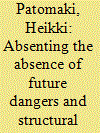

|
|
|
|
|
| Summary/Abstract |
One of the great appeals of securitization theory, and a major reason for its success, has been its usefulness as a tool for empirical research: an analytic framework capable of practical application. However, the development of securitization has raised several criticisms, the most important of which concern the nature of securitization theory. In fact, the appropriate methods, the research puzzles and type of evidence accepted all derive to a great extent from the kind of theory scholars bequeath their faith to. This Forum addresses the following questions: What type of theory (if any) is securitization? How many kinds of theories of securitization do we have? How can the differences between theories of securitization be drawn? What is the status of exceptionalism within securitization theories, and what difference does it make to their understandings of the relationship between security and politics? Finally, if securitization commands that leaders act now before it is too late, what status has temporality therein? Is temporality enabling securitization to absorb risk analysis or does it expose its inherent theoretical limits?
|
|
|
|
|
|
|
|
|
|
|
|
|
|
|
|
| 2 |
ID:
189030
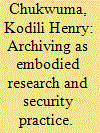

|
|
|
|
|
| Summary/Abstract |
This article explores the importance of embodiment in (research on) archival practices on state counter-terrorism policy in Nigeria. In doing so, the article seeks to contribute to the ongoing discussion around methodology and methods in critical security studies and other related fields in international relations by focusing on (researchers’) bodies as sites of knowledge production and intervention. Building on three empirical themes of fragmentation, labelling and gatekeeping that emerged from fieldwork in Abuja, Nigeria, I demonstrate how embodiment operates in active research contexts in the production – and problematization – of in/security. To do this, I draw inspiration from ideas around state archival practice; embodiment in critical security studies, especially as discussed in feminist and postcolonial work; and in/security theory to scaffold my broader methodological approach. A focus on embodiment, the article argues, marks the researcher’s body – and research – as integral to the development of theories and findings about security. At the same time, exploring the ways in which the (researcher’s) body is (re)produced in relation to identity and subjectivity encourages greater reflexivity in our research practice and fieldwork, as we are continually reminded that our work and our words are grounded in the standpoints that we occupy. The article concludes by identifying some useful strategies from my fieldwork for grappling with the challenges and tensions that emerge from bodily encounters in (security) research process.
|
|
|
|
|
|
|
|
|
|
|
|
|
|
|
|
| 3 |
ID:
164285
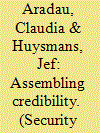

|
|
|
|
|
| Summary/Abstract |
Critical approaches in security studies have been increasingly turning to methods and standards internal to knowledge practice to validate their knowledge claims. This quest for scientific standards now also operates against the background of debates on ‘post-truth’, which raise pressing and perplexing questions for critical lines of thought. We propose a different approach by conceptualizing validity as practices of assembling credibility in which the transversal formation and circulation of credits and credentials combine with disputes over credence and credulity. This conceptualization of the validity of (critical) security knowledge shifts the focus from epistemic and methodological standards to transepistemic practices and relations. It allows us to mediate validity critically as a sociopolitical rather than strictly scientific accomplishment. Developing such an understanding of validity makes it possible for critical security studies and international relations to displace epistemic disputes about ‘post-truth’ with transversal practices of knowledge creation, circulation and accreditation.
|
|
|
|
|
|
|
|
|
|
|
|
|
|
|
|
| 4 |
ID:
165014
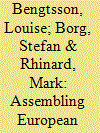

|
|
|
|
|
| Summary/Abstract |
The securitization of health concerns within the European Union has hitherto received scant attention compared to other sectors. Drawing on the conceptual toolbox of actor-network theory, this article examines how a ‘health security assemblage’ rooted in EU governance has emerged, expanded, and stabilized. At the heart of this assemblage lies a particular knowledge regime, known as epidemic intelligence (EI): a vigilance-oriented approach of early detection and containment drawing on web-scanning tools and other informal sources. Despite its differences compared to entrenched traditions in public health, EI has, in only a decade’s time, gained central importance at the EU level. EI is simultaneously constituted by, and performative of, a particular understanding of health security problems. By ‘following the actor’, this article seeks to account for how EI has made the hunt for potential health threats so central that detection and containment, rather than prevention, have become the preferred policy options. This article draws out some of the implications of this shift.
|
|
|
|
|
|
|
|
|
|
|
|
|
|
|
|
| 5 |
ID:
078775
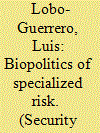

|
|
|
|
|
| Publication |
2007.
|
| Summary/Abstract |
This article offers a biopolitical security analytic of kidnap and ransom (K&R) insurance. It suggests that security phenomena should be analysed in terms of the problematizations through which they are expressed. With reference to Foucault's concept of biopower, K&R insurance is studied as part of a security dispositif designed to deal with the problematic of kidnap risk. The biopolitical security that results is aimed at enabling the circulation of the client should a kidnap event occur. As such, it is a personalized private provision of security premised upon the promotion of an individual's capacity to circulate in the future. Using the story of a kidnap event, the article analyses the micro-practices through which a population of `kidnapping prospects' is created, the underwriting process through which prospective clients undergo a security audit, and the forms of security that derive from this dispositif. It argues that the value of the concept of biopower for security analysis is its potential for explaining problematics that are not circumscribed to a fixed referent object but relate to the emergent features of the changing character of the human being
|
|
|
|
|
|
|
|
|
|
|
|
|
|
|
|
| 6 |
ID:
187503
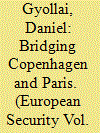

|
|
|
|
|
| Summary/Abstract |
Integrating the discursive and practice-based approach to securitisation, this article explores how the police function as the audience of securitising discourse. Taking the Hungarian case of border control, it looks into how the police accept and buy into anti-immigrant discourses of the political elite. Based on a questionnaire survey of Hungarian police officers, it demonstrates the potential of discursive legitimation in shaping officers’ understanding of mass migration. It describes the ways in which attitudes and hence, arguably, practice can be conditioned by securitising discourse. The overall aim of the article is to advance the understanding of the narrative dimension of power struggles between police and the political elite, and how that structures the field of border security. Critical security scholars have pointed out that police filter securitising discourse based on their professional dispositions and preferences. However, the Hungarian case seems to suggest that discourse may, in fact, influence dispositions themselves.
|
|
|
|
|
|
|
|
|
|
|
|
|
|
|
|
| 7 |
ID:
161266
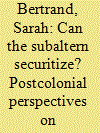

|
|
|
|
|
| Summary/Abstract |
Drawing on postcolonial and feminist writings, this article re-examines securitization theory’s so-called ‘silence-problem’. Securitization theory sets up a definably colonial relationship whereby certain voices cannot be heard, while other voices try to speak for those who are silenced. The article shows that the subaltern cannot securitize, first, because they are structurally excluded from the concept of security through one of three mechanisms: locutionary silencing, illocutionary disablement, or illocutionary frustration. Second, the subaltern cannot securitize because they are always already being securitized and spoken for – as in this case by the well-meaning intellectuals trying to highlight and remediate their predicament. Third, the subaltern cannot securitize because the popular rendering of securitization theory as critical obfuscates and rationalises their marginalisation. This article thus reveals the ‘colonial moment’ in securitization studies, showing how securitization theory is complicit with securitizations ‘for’ that marginalise and silence globally, not just locally outside ‘the West’.
|
|
|
|
|
|
|
|
|
|
|
|
|
|
|
|
| 8 |
ID:
141461
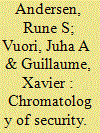

|
|
|
|
|
| Summary/Abstract |
The agenda of this article is to highlight how security becomes intelligible, is enacted, contested and (re)appropriated in part through colour use. Even though colours are a natural phenomenon, their meanings are societal products, and part of our constructed visibilities. These can be investigated through chromatology, the study of colour in relation to people. We illustrate this by applying multimodal social semiotics to view highly securitized sites, those of concentration and enemy-combatant camps. We show that the colour uses instituted to classify and govern prisoners not only structure the inmates socially, but also become vehicles for resisting the security discourses associated with them. The aim of the article is to highlight how security and international relations are intersemiotic relations, and to open up the study of security to an expanded range of semiotic modalities and methods of inquiry.
|
|
|
|
|
|
|
|
|
|
|
|
|
|
|
|
| 9 |
ID:
141780
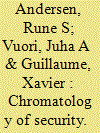

|
|
|
|
|
| Summary/Abstract |
The agenda of this article is to highlight how security becomes intelligible, is enacted, contested and (re)appropriated in part through colour use. Even though colours are a natural phenomenon, their meanings are societal products, and part of our constructed visibilities. These can be investigated through chromatology, the study of colour in relation to people. We illustrate this by applying multimodal social semiotics to view highly securitized sites, those of concentration and enemy-combatant camps. We show that the colour uses instituted to classify and govern prisoners not only structure the inmates socially, but also become vehicles for resisting the security discourses associated with them. The aim of the article is to highlight how security and international relations are intersemiotic relations, and to open up the study of security to an expanded range of semiotic modalities and methods of inquiry.
|
|
|
|
|
|
|
|
|
|
|
|
|
|
|
|
| 10 |
ID:
093783
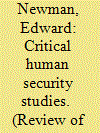

|
|
|
|
|
| Publication |
2010.
|
| Summary/Abstract |
From a critical security studies perspective - and non-traditional security studies more broadly - is the concept of human security something which should be taken seriously? Does human security have anything significant to offer security studies? Both human security and critical security studies challenge the state-centric orthodoxy of conventional international security, based upon military defence of territory against 'external' threats. Both also challenge neorealist scholarship, and involve broadening and deepening the security agenda. Yet critical security studies have not engaged substantively with human security as a distinct approach to non-traditional security. This article explores the relationship between human security and critical security studies and considers why human security arguments - which privilege the individual as the referent of security analysis and seek to directly influence policy in this regard - have not made a significant impact in critical security studies. The article suggests a number of ways in which critical and human security studies might engage. In particular, it suggests that human security scholarship must go beyond its (mostly) uncritical conceptual underpinnings if it is to make a lasting impact upon security studies, and this might be envisioned as Critical Human Security Studies (CHSS).
|
|
|
|
|
|
|
|
|
|
|
|
|
|
|
|
| 11 |
ID:
183726
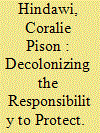

|
|
|
|
|
| Summary/Abstract |
Many postcolonial or critical scholars are rather sceptical of the Responsibility to Protect principle. In most of the critical literature, Responsibility to Protect (R2P) is presented as a product from the West, whose liberal ideal relies on a perception of Southern states being potentially dysfunctional, which in turn justifies an interventionist discourse with neocolonial overtones. The problem with this interpretation of R2P is that it essentially ignores non-Western, particularly Southern, inputs on the concept, falling precisely into the trap that, many authors claim, vitiates Responsibility to Protect: its West-centrism. Building upon a mix of critical, decolonial, postcolonial and Third World Approaches to International Law scholarship, this article proposes a number of additional steps to decolonize R2P in an effort to avoid what Pinar Bilgin describes as ‘conflating the critiques of the particularity of universals with critiques of the idea of having universals’. What successive decolonizing layers expose is a negotiation process in which the agency of states from the global South in shaping the – still controversial – principle has proved particularly obvious. Decolonizing Responsibility to Protect, this article argues, requires critical scholars to engage in a contrapuntal analysis in order to acknowledge the concept’s mutual constitution by the West and the ‘rest’ and the deeper struggles over universals hiding underneath.
|
|
|
|
|
|
|
|
|
|
|
|
|
|
|
|
| 12 |
ID:
159214
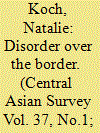

|
|
|
|
|
| Summary/Abstract |
Across Eurasia, authoritarian leaders have sought to justify their ‘strong-hand’ approach to government by framing instability as a security threat and the strong state as a guarantor of political stability. Such ‘regimes of certainty’ promote a modernist valorization of order, the flip side of which is a demonization of political disorder instability, or mere uncertainty. Examining the spatial and temporal imaginaries underpinning such narratives about in/stability in Central Asia, this paper compares official discourse in Kazakhstan and Uzbekistan, where state-controlled media and official publications have stigmatized political instability in Kyrgyzstan as indicative of the dangers of political liberalization and a weak state. Ostensibly about the ‘other’, these narratives are also about scripting the ‘self’. I argue that official interpretations of ‘disorder over the border’ in Kyrgyzstan are underpinned by a set of spatial and temporal imaginaries that do not merely reflect regional moral geographies, but actively construct them.
|
|
|
|
|
|
|
|
|
|
|
|
|
|
|
|
| 13 |
ID:
145147
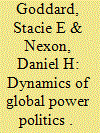

|
|
|
|
|
| Summary/Abstract |
We call for a research program focused on the dynamics of global power politics. Rather than link realpolitik to structural-realist theoretical frameworks or the putatively anarchical character of world politics, the program treats power politics as an object of analysis in its own right. It embraces debate over the nature of global power politics among scholars working with distinctive approaches. It sees the structural contexts of power politics as highly variable and often hierarchical in character. It attenuates ex ante commitments to the centrality of states in global politics. And it takes for granted that actors deploy multiple resources and modalities of power in their pursuit of influence. What binds this diverse research program together is its focus on realpolitik as the politics of collective mobilization in the context of the struggle for influence among political communities, broadly understood. Thus, the study of the dynamics of collective mobilization—the causal and constitutive pathways linking efforts at mobilization with enhanced power—brings together approaches to security studies in a shared study of power politics.
|
|
|
|
|
|
|
|
|
|
|
|
|
|
|
|
| 14 |
ID:
126706
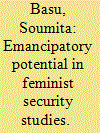

|
|
|
|
|
| Publication |
2013.
|
| Summary/Abstract |
Forum: The State of Feminist Security Studies: Continuing the Conversation. This forum comprises seven pieces conceived in response to the recent Politics & Gender Critical Perspectives section that featured contributions from Carol Cohn, Valerie Hudson, Jennifer Lobasz, Laura Sjoberg, Ann Tickner, Annick Wibben, and Lauren Wilcox (P&G 2011, Vol. 7, Issue 4). Throughout, we refer to this collection as "the CP section."
|
|
|
|
|
|
|
|
|
|
|
|
|
|
|
|
| 15 |
ID:
138085
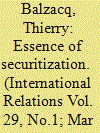

|
|
|
|
|
| Summary/Abstract |
One of the great appeals of securitization theory, and a major reason for its success, has been its usefulness as a tool for empirical research: an analytic framework capable of practical application. However, the development of securitization has raised several criticisms, the most important of which concern the nature of securitization theory. In fact, the appropriate methods, the research puzzles and type of evidence accepted all derive to a great extent from the kind of theory scholars bequeath their faith to. This Forum addresses the following questions: What type of theory (if any) is securitization? How many kinds of theories of securitization do we have? How can the differences between theories of securitization be drawn? What is the status of exceptionalism within securitization theories, and what difference does it make to their understandings of the relationship between security and politics? Finally, if securitization commands that leaders act now before it is too late, what status has temporality therein? Is temporality enabling securitization to absorb risk analysis or does it expose its inherent theoretical limits?
|
|
|
|
|
|
|
|
|
|
|
|
|
|
|
|
| 16 |
ID:
171804
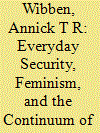

|
|
|
|
|
| Summary/Abstract |
This article returns to the original forum question “What is Global Security Studies?,” looking at it in relation to the theme of inclusion and exclusion to point out that security studies scholars exclude feminist scholarship on (everyday) security at their own peril. Showcasing the increasing body of feminist security studies scholarship, the article then highlights not only what scholarship might be included in a truly global security studies, but also the important insights (e.g., about the continuum of violence that spans peace- and wartime) that are missed without it. The article ends with a reflection on the need to also include a wider range of approaches as eminently valuable to global security studies.
|
|
|
|
|
|
|
|
|
|
|
|
|
|
|
|
| 17 |
ID:
164287
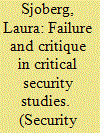

|
|
|
|
|
| Summary/Abstract |
Debates imitates scholarship, which imitates debate. Using perspectives from both my policy debate career and my research career, this article argues that the enterprise of critique, whether in critical security studies or elsewhere, is always and already failing and failed. It proceeds in four sections. The first section sets up my entry into the problems of/with critique. The second section analyzes the types of dissonances inherent in the production of critical security studies scholarship. The third section theorizes those dissonances as failures – arguing that failure itself is a part of in and of critical security studies. The conclusion discusses where to go from, during, and in a world of failed critique in critical security studies.
|
|
|
|
|
|
|
|
|
|
|
|
|
|
|
|
| 18 |
ID:
168963
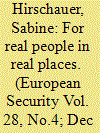

|
|
|
|
|
| Summary/Abstract |
This article builds on most recent scholarship, increasingly critical of the uncritical, or non-critical in critical security studies. Through the empirical context of migration and the theoretical structure of the Copenhagen School, this inquiry draws attention to the hegemonic dominance of securitisation’s negative logic. With Germany as its case study, this article unpacks why and how the securitisation of migration is already always of a distinctly linear, segregating, violent, hence, negative and undesirable security determinism. More simply put: for decades, security and securitisation in critical security studies scholarship remain conflated into the same conditions and practices, reiterating the same meanings, namely: insecurity. By exploring a more inclusive, progressive type of securitisation framing through the subject rather than the referent object locus, this inquiry directs attention to a different kind of what Jef Huysmans initially termed in 2011 “little security nothings.” These other security “nothings,” also so profoundly infused with power, are found embedded in everyday meso-level practices performed and exercised by pro-migration, non-elite, fringe grassroots securitisation actors and audiences such as Germany’s Green Party and many non-governmental organisations (NGOs). This everyday advocacy on-the-ground in Germany animates and sustains inclusive registers of meanings, which make “real people in real places” feel safe and secure.
|
|
|
|
|
|
|
|
|
|
|
|
|
|
|
|
| 19 |
ID:
167408
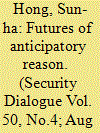

|
|
|
|
|
| Summary/Abstract |
This article examines invocations of the future in contemporary security discourse and practice. This future constitutes not a temporal zone of events to come, nor a horizon of concrete visions for tomorrow, but an indefinite source of contingency and speculation. Predictive, preemptive and otherwise anticipatory security practices strategically utilize the future to circulate the kinds of truths, beliefs, claims, that might otherwise be difficult to legitimize. The article synthesizes critical security studies with broader humanistic thought on the future, with a focus on the sting operations in recent US counter-terrorism practice. It argues that the future today functions as an ‘epistemic black market’, a zone of tolerated unorthodoxy where boundaries defining proper truth-claims become porous and flexible. Importantly, this epistemic flexibility is often leveraged towards a certain conservatism, where familiar relations of state control are reconfirmed and expanded upon. This conceptualization of the future has important implications for standards of truth and justice, as well as public imaginations of security practices, at a time of increasingly preemptive and anticipatory securitization.
|
|
|
|
|
|
|
|
|
|
|
|
|
|
|
|
| 20 |
ID:
129846
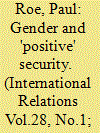

|
|
|
|
|
| Publication |
2014.
|
| Summary/Abstract |
Focusing predominantly on the works of Ken Booth and Bill McSweeney, this article explores how the normative commitment of the two writers to the individual referent and to a set of values constitutive of human agency is reflective of a more 'positive' security. In particular, the article focuses on how in their formulation of values, both Booth (security as emancipation) and McSweeney (ontological security) draw on gender and feminist approaches and, importantly, how critical feminist scholarship can profitably be used to reconcile concentration on both the global and the local, thus providing greater conceptual clarity and empirical grounding to the positive security project.
|
|
|
|
|
|
|
|
|
|
|
|
|
|
|
|
|
|
|
|
|